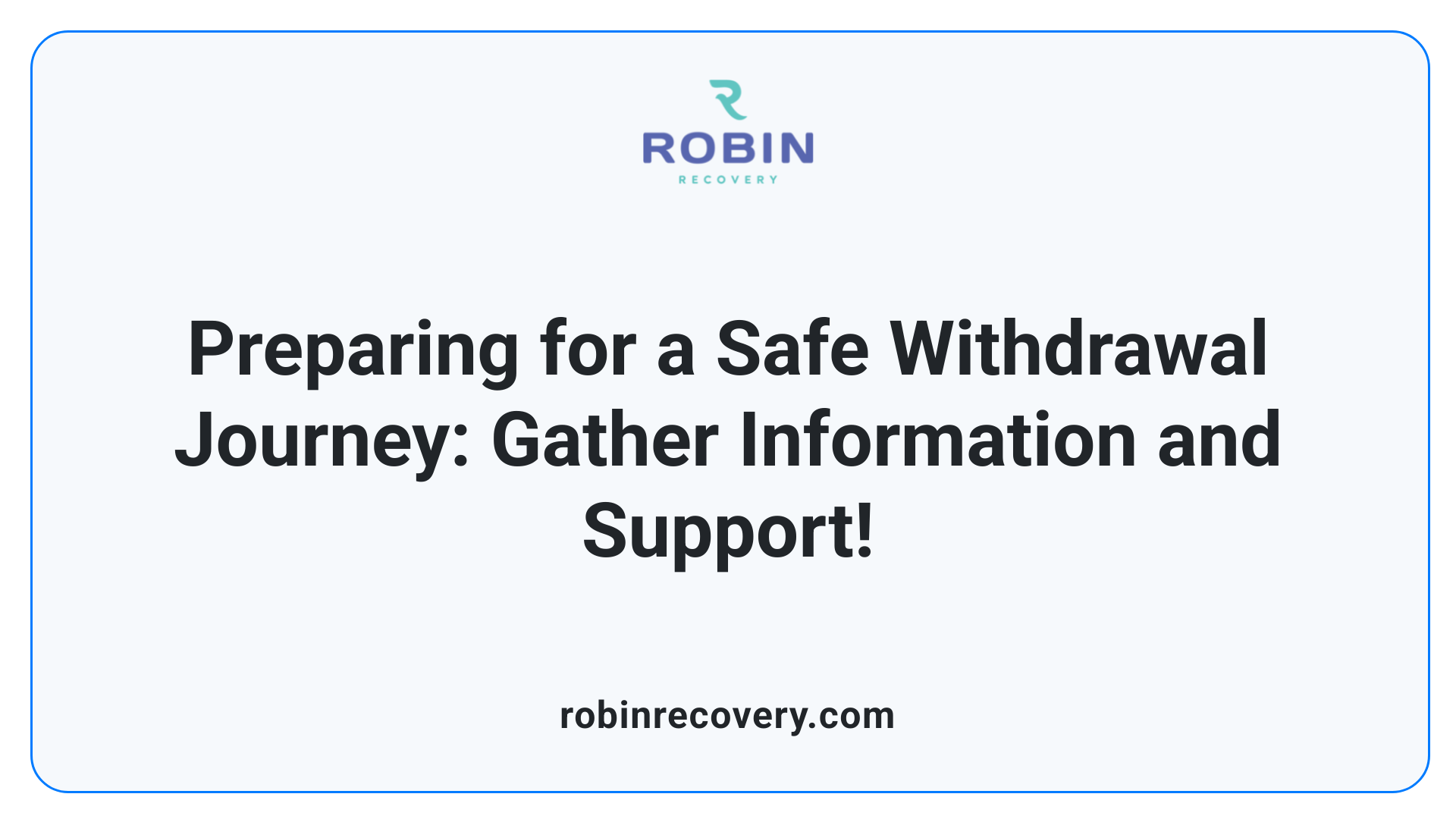How to Transition Off Medications Safely in Recovery

Introduction to Medication Tapering in Recovery
Transitioning off medications during recovery from substance use or mental health issues can be a pivotal step in personal health journeys. This process, when carefully managed, can help individuals achieve greater self-control, better health outcomes, and a sense of empowerment. However, going off medications is not without challenges, and comes with the essential need for proper guidance and support.
Understanding the Basics of Medication Tapering

Importance of Gathering Information and Support
Before starting the withdrawal process from medication, it's vital to gather comprehensive information and establish a robust support system. This preparation aids in developing a safe plan for transitioning off medication, ultimately making the process smoother.
Risks of Stopping Medications Suddenly
Abruptly stopping medications, often referred to as going "cold turkey," poses significant risks. It can lead to severe withdrawal symptoms and exacerbate existing mental health issues. Symptoms can vary widely, including anxiety, flu-like sensations, and even life-threatening reactions, particularly with substances like alcohol or opioids. Therefore, a gradual tapering method is strongly recommended for anyone looking to discontinue their medication safely.
Consultation with Healthcare Professionals for Tapering Plans
Consulting a healthcare professional before reducing medication is essential. A qualified practitioner can help devise a tapering plan tailored to individual needs and circumstances. This plan typically involves reducing one medication at a time to avoid complications from drug interactions. Closing this loop with medical oversight ensures a structured tapering process, minimizing risks and enhancing overall safety.
How do you safely come off medication?
To safely come off medication, it's critical to consult with a healthcare professional to create an individualized tapering plan that gradually reduces your dose, minimizing the risk of withdrawal symptoms. Abruptly stopping medication can lead to severe side effects and worsen mental health conditions, so a gradual approach is essential. Choose a time to begin the withdrawal process when you are not under significant stress or facing major life changes. Support from friends and family can be invaluable during this time, and developing coping strategies, such as keeping a mood diary or practicing self-care, can help manage the transition. Finally, prioritize your physical and emotional health throughout the process to enhance your overall well-being.
Topic Key Points Further Steps Importance of support Gather information; establish a supportive network Involve friends, family, or support services Risks of stopping suddenly Severity of withdrawal symptoms; potential relapse Implement a tapering strategy Need for professional guidance Individualized tapering plan; reduce one medication at a time Regular monitoring and adjustments
Drink Smart: The Role of Hydration in Transitioning Off Medications

Importance of hydration during tapering
Staying hydrated is crucial when tapering off medications. Proper hydration can aid in minimizing withdrawal symptoms and supporting overall bodily functions. As the body adjusts to medication changes, hydration helps facilitate this transition smoothly.
Effects of water on medication processing
Water plays an essential role in processing medications in the body. Drinking water helps flush out medications more effectively by supporting kidney function in excreting drug waste. Adequate hydration can also alleviate common medication side effects like constipation and dry mouth.
Does drinking water help flush out medication?
Drinking water does help flush out medication by ensuring that the kidneys can effectively process and excrete waste from the medications. Adequate hydration also aids in the proper absorption of medications, maximizing their effectiveness in the body. Drinking the right amount of water can help minimize common side effects of medications, such as constipation and dry mouth. It's important to note that the required water intake can vary based on factors like diet, age, and specific medications, some of which may require taking additional precautions regarding hydration. Therefore, it's advisable for patients to consult their healthcare providers for individualized recommendations on water intake when taking medications.
Navigating Withdrawal Symptoms During Medication Tapering

Symptoms and Duration of Medication Withdrawal
Withdrawal symptoms can vary significantly between individuals and depend on the specific medication involved. Common symptoms may include:
- Flu-like symptoms: These can manifest as body aches, fatigue, and headaches.
- Gastrointestinal issues: Nausea, vomiting, and diarrhea can occur during withdrawal.
- Mental health changes: Increased anxiety, mood swings, and depression may intensify during tapering.
Typically, withdrawal symptoms begin 12 to 48 hours after the last dose and may last from a few days to several weeks. For antidepressants, symptoms often become noticeable 2-4 days post-discontinuation, persisting even longer in some cases.
Non-Pharmacologic Techniques for Managing Withdrawal
To manage withdrawal symptoms effectively, various non-pharmacologic techniques can be employed:
- Stay Hydrated: Drinking plenty of water can help alleviate symptoms and keep the body functioning optimally.
- Nutritious Diet: A diet rich in carbohydrates, proteins, fruits, and vegetables can stabilize mood and reduce cravings.
- Exercise: Engaging in regular, gentle exercise, such as brisk walking or yoga, can improve overall mood and reduce stress levels.
- Relaxation Techniques: Practices such as meditation, deep breathing exercises, and music therapy promote emotional well-being.
Establishing a strong support system of family, friends, or support groups can also provide essential encouragement and accountability throughout the tapering process, enhancing overall recovery success.
Timeframes for Recovery: Finding Stability After Discontinuation
Different Timelines for Withdrawal Symptoms Depending on Substance
The duration and intensity of withdrawal symptoms can differ widely based on the substance involved and individual factors. Here's a breakdown of common substances:
Substance Withdrawal Start Peak Timing Duration Alcohol 6 to 12 hours 24 to 72 hours Weeks to months Opioids 8 to 24 hours 1 to 3 days 4 to 10 days Benzodiazepines 1 to 4 days Up to 2 weeks Months for some individuals
These timeframes highlight the variability in withdrawal experiences. It's crucial to acknowledge that severe symptoms can emerge, especially for substances like alcohol or benzodiazepines, necessitating careful medical oversight.
The Importance of Medical Detox
Supervised medical detox is vital when discontinuing any medication. Having healthcare professionals involved ensures safety and provides support during the withdrawal process. They can manage symptoms and adjust protocols based on individual responses to the tapering process.
This medical supervision not only facilitates a more comfortable transition but also reduces the risks of potential complications that could arise when stopping medication abruptly. It's advisable to engage with a healthcare provider before any attempt to stop medication to establish a personalized tapering plan.
Consulting a doctor thoroughly can prevent setbacks and contribute to overall recovery success.
Creating a Supportive Environment for Successful Tapering
The Importance of a Support Network
A robust support network plays a crucial role during the tapering process. Engaging friends and family not only increases accountability but also provides a safety net during challenging times. Informing loved ones about the withdrawal experience allows them to offer emotional support and understanding.
Roles of Healthcare Providers and Family
Consulting with healthcare professionals is essential to develop a personalized tapering plan. Doctors can offer guidance on the appropriate dosage reduction and monitor withdrawal symptoms to ensure safety. Meanwhile, family members can assist by keeping the environment supportive and free from distractions or temptations.
Communication Strategies During Tapering
Effective communication is vital. Regularly sharing feelings, progress, and struggles with both healthcare providers and family fosters a collaborative approach. Keeping an open dialogue helps adjust the tapering strategy as needed, addressing any issues early on to prevent potential setbacks.
Alternatives and Complementary Therapies in Recovery
Alternative therapies to medications
Incorporating alternative therapies can significantly aid recovery as individuals taper off medications. Options like running therapy and meditation can help manage stress and promote mental calmness. These practices encourage physical engagement and mindfulness, which can support emotional resilience during withdrawal.
Complementary activities that support the withdrawal process
Complementary activities play a crucial role in enhancing recovery efforts. Techniques such as psychotherapy, yoga, and engaging in creative expression can alleviate anxiety and improve overall mood. These practices not only facilitate emotional healing but also provide tools to cope with cravings and withdrawal symptoms, thereby enhancing the tapering experience.
Continuous emotional and physical well-being techniques
Maintaining a balance between emotional and physical health is vital during withdrawal. Techniques like regular exercise, healthy eating, and relaxation methods (e.g., deep breathing or music therapy) can help mitigate withdrawal symptoms and reduce the risk of relapse. Establishing a self-care routine focused on both physical activity and mindfulness ensures a holistic approach to recovery, promoting long-term well-being.
Building a Structured Tapering Plan for Recovery
Importance of having a detailed tapering plan
Before initiating the withdrawal process, it's crucial to gather information and form a structured tapering plan. This proactive approach aids in safely transitioning off medications, thus minimizing potential withdrawal symptoms and psychological distress.
Structured timelines and methods for withdrawal
Creating a tapering schedule involves reducing medications gradually. Patients should ideally reduce one medication at a time to prevent complications. Consultation with a healthcare professional can facilitate personalized plans, often involving tactics like direct tapering, substitution tapering, or titration tapering, each serving different needs.
Indicators of successful tapering
Tracking progress during the tapering process is essential. Indicators include reduced withdrawal symptoms and stability in mental health. Regular self-monitoring and maintaining an open dialogue with healthcare providers help ensure that adjustments to the tapering plan can be made, promoting effective management of the withdrawal experience.
Recognizing and Managing Relapse: Part of the Healing Journey

Understanding relapse as part of recovery
Relapse is often seen as a setback in the journey toward recovery, but it is crucial to understand that it can be a normal aspect of overcoming addiction. Many individuals may experience multiple relapses before achieving lasting sobriety. Recognizing this helps to maintain motivation and acceptance during the healing process, as it does not mean that treatment has failed, but rather that it may need to be adjusted.
Strategies for dealing with setbacks
- Stay Connected: Engage regularly with your support network of friends, family, or a recovery community. They can offer encouragement and accountability during tough times.
- Self-Monitoring: Keep track of your feelings and triggers by maintaining a mood diary. This can help identify patterns that lead to relapse.
- Place Boundaries: Ensure there are no substances in your environment that could tempt you. Creating a safe space at home is vital.
- Practice Self-Care: Focus on nutrition, hydrate well, and exercise to maintain physical and emotional wellbeing.
Long-term recovery goals
Establishing SMART goals can provide a structured framework for recovery. Specific, Measurable, Achievable, Realistic, and Timely milestones keep individuals focused on progress. Additionally, develop positive routines and habits that reinforce sobriety, as well as engaging in therapies such as CBT or mindfulness to address mental health challenges and stressors, which support sustainable recovery.
Conclusion: A Safe and Supportive Transition Off Medications
The journey to tapering off medications safely in recovery requires careful planning, medical supervision, and a robust support network. By understanding the mechanisms and challenges involved, individuals can better prepare themselves for potential withdrawal symptoms and nurture their mental and physical health. It's vital for those embarking on this journey to seek out professional guidance and maintain open communication lines with healthcare providers, peers, and family. Ultimately, successful tapering and eventual recovery provide an opportunity for empowerment and improved health outcomes, reinforcing the importance of a well-structured approach to medication discontinuation.
References
- Planning for withdrawal - coming off medication - Mind
- Drug Taper: Definition, Example & Treatment - The Recovery Village
- 32 tips for tapering off medication * PsychosisNet.com .com
- A Patient's Guide to Opioid Tapering - HSS
- Medications for Substance Use Disorders - SAMHSA
- Treatment and Recovery | National Institute on Drug Abuse (NIDA)
- How to Detox from Prescription Drugs | MAT Center - BrightView
- Self-care During Withdrawal | Psychiatric Medication - Mind
- How to reduce or quit drugs
